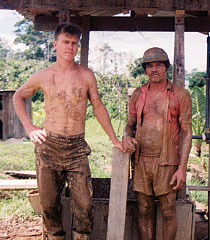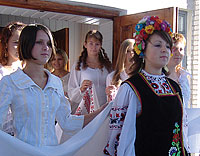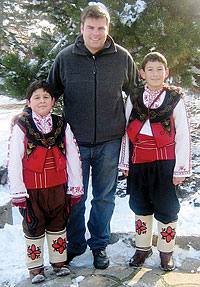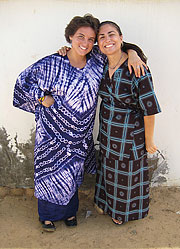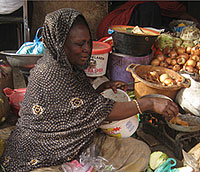The Toughest Job You'll Ever Love
Alumni Peace Corps volunteers committed to making the world a better place
By Marsha Anderson
Whether teaching English, building homes, growing rice, organizing community projects, learning to castrate pigs, deflecting unwanted marriage proposals, or experiencing loneliness and isolation, CLU alumni have found that service in the Peace Corps lives up to its slogan, “the toughest job you’ll ever love.”
A Peace Corps recruiter on campus sealed the deal for English major Ed Keesling ’66 just before graduation. Assigned to India, he received three months’ training during which he “learned to speak Bengali, cultivate wetland rice, raise chickens, and live in a very different culture.”
In West Bengal, working with a food production project dedicated to helping rural farmers increase their food production in all areas, he helped introduce a new high yielding variety of rice, developed approximately 50 small home poultry operations for egg production, and started a wholesale egg market in Calcutta. After his service there, he became Associate Director for Peace Corps Uganda, training other Peace Corps volunteers. That’s where things got a little too exciting.
As Keesling explains, “After the Coup [in 1971], when Idi Amin took over the country…, two of our volunteers were killed by the army, and the U.S. government withdrew from Uganda. My final job with PC Uganda was to evacuate all of the volunteers, close the office and turn out the lights.”
Keesling’s subsequent career as a
ceramics professor, elementary school
teacher and now arts volunteer is a direct
result of his PC service. “It seems that
every job I’ve had has had something to
do with learning new skills and teaching
them to others,” he said, noting
his broader world view, knowledge of
different cultures and personal relationships
have made him a better teacher
and citizen.
A Simple Way to Improve Lives
Interested in Serving Others
Current CLU Students
For CLU students interested in the Peace Corps, Habitat for Humanity or other international service, Chantelle McCain '05 Kley advises strengthening one's qualifications first by going out and getting any kind of international experience you can, or service closer to home like AmeriCorps. "I think that volunteering anywhere, especially internationally, gives you a better perspective on what you really want out of your life," she says.
CLU Alumni
Alumni interested in pursuing service opportunities may call the campus Career Services office (805-493-3200) to register for access to the service/jobs/graduate school postings Web site. It's never too late — the Peace Corps has a special "Fifty plus" program just for baby boomers!
Other CLU Peace Corps Volunteers:
- Etienne Emanuel '04
Communication, Ukraine, 2005-07 - Michael D. Emery '96
Interdisciplinary Studies, Morocco, 1998-99 - Karly Wilhelm '05
English, Romania, 2006-08 - Catherine Lundring '69 Hillard
English, Togo, 2005-07 - DeEttra Kudera '96 Mulay
English, Morocco, 1998-99 - Brian Stethem '84
English, Costa Rica, 1986-88
Did you serve in the Peace Corps?
Let us know at alumni@callutheran.edu
Paul Neuhaus ’83 was an art major with no clear idea of what he wanted to do in life. Over his years as a student, he developed a pattern of spending his January interim sessions traveling to Mexico and South American countries. It was during an extended three-month trip to Central and South America organized by art professor Jerry Slattum that Neuhaus’ interest in the Peace Corps grew into a desire to serve.
Assigned to Costa Rica, Neuhaus received agricultural training that included such varied skills as how to apply fertilizer, dig a well by hand and castrate a pig. He was encouraged to show initiative in the village where he lived, a place with no electricity, plumbing, telephone or TV.
In his training, he had learned how to use a six-inch auger to dig a well by hand, but he went one better and designed a well that was three feet in diameter and 10 feet deep. Watching a company make culverts gave him the idea to create a mold of sheet metal and wood to form a cylinder. After pouring concrete around the perimeter, he would let it harden, then pull the mold out and repeat the process up to ground level. Over his two years in Costa Rica, he made 15 such wells.
“The idea was that I was to teach people who then could teach others,” Neuhaus relates. “It is very satisfying to see people’s lives improve to such a great extent with something so simple.”
The wells project was so construction-oriented that it probably influenced Neuhaus to become an architect. In fact, when he applied for graduate school at UCLA, his portfolio included that project. Now an architect in Minneapolis, the former volunteer has been back to Costa Rica twice since his Peace Corps service. Thinking back on how being in a completely different environment, under very primitive conditions, helped him to grow, Neuhaus reflects, “You completely remove yourself from your comfort zone, take risks, learn the language, and meet people . . . and gain lifetime friends.”
Subtropics to Subzero
While Neuhaus dug wells in the Costa Rican heat, a hemisphere away and 20 years later Teresa Olson ’05 worried about finding fur boots so her feet wouldn’t freeze in the Ukrainian winter. For the communication major, the Peace Corps seemed a good fit for what she wanted to do.
“I had three goals,” she explains. “I wanted to remember how lucky I am to live in such a prosperous country. I wanted to help improve the lives of those who have far less than I do. And I also wanted to take an active role in understanding and shaping the USAID [Agency for International Development] and foreign policy that I was so quick to complain about. Peace Corps was a little bit of all of those, so it sounded perfect.”
In December 2005, Olson found herself in Ukraine, teaching English to children grades 5 through 11, organizing an HIV/AIDS camp and working on other community projects. When it came time for her to leave, she was surprised and gratified to realize the impact she had had.
Olson now works as the development coordinator at Interplast, a humanitarian organization based in Mountain View, Calif., that provides free reconstructive surgery for children with cleft lips and palates, disabling burns and hand injuries.
Reflecting on her volunteer experience, she says, “I think everyone has to have at least some desire to do good, or they wouldn’t make it past six months. It takes more than a need for adventure or a desire to teach English to support the emotional distress of being without friends and family in a country where you hardly speak the language.”
Bulgarian Alumni Chapter?
Chantelle McCain ’05 Kley had known since she was 12 that she wanted to enter the Peace Corps some day. That some day came last year when she and husband Joshua Kley ’04 found themselves on their way to a small Bulgarian town near the Greek border.
Kley credits Brian Stethem ’84, his teacher and mentor and a former Peace Corps volunteer, for answering his concerns about serving. “Everything he said about the benefits and struggles was an inspiration. Everyone at CLU encouraged me to do what I wanted to do, to follow what I believed.”
Less than a year into their Bulgarian service, multimedia major Kley teaches English at the local secondary school, and McCain Kley, a political science/French double major, teaches at a primary school. While their work is very demanding, there has not been a single day when either has wanted to go home. “It’s so beautiful here,” said McCain Kley, “with mountains all around the town. We love to go hiking on weekends.”
Last fall, the Kleys met Jimmy Wall ’07, who has been in Bulgaria
for a year and a half and lives and works two hours away. Wall is putting
his political science degree to use working for Chirpan city hall’s
Department of External Resources to increase the city’s quality of life.
His projects have included helping to establish an at-risk Children’s
Center and researching funding opportunities to repair village medical
centers. To learn more about Wall’s daily life in the Peace Corps, visit
his blog at www.JimmyBulgaria.wordpress.com
Inspired by his father’s humanitarian work in West Africa, Wall met a Peace Corps recruiter while he was interning at Amnesty International in Washington, D.C. With the advice and encouragement of CLU business professor and former Peace Corps volunteer Randall Donohue, Wall was motivated to enlist by a desire to learn how the world works, how policy meets reality, and how “the other half” lives while at the same time doing something to make the world a better place.
He has not been disappointed. People savor their relationships here, he says, adding that more work happens at a local café than in the office, and a dinner at a restaurant can last several hours. His experiences so far have strengthened his resolve to find a career in international relations and human rights as well as to volunteer in the community.
“The toughest part about being a Peace Corps volunteer in Bulgaria [a country long under Communist rule] is trying to change people’s mindset and give them hope that they can make a difference after years of being told what to do,” Wall says.
Mauritanian Tag Team
Call them CLU’s own Mauritanian
tag team, but Michele Hernandez’07, a French/Spanish/
international studies major at
CLU, was willing and able to
take up the baton of Peace
Corps service passed to her
by her best friend, Clarice
Hammett ’06. For both
women, assignment to a
French-speaking country in
Africa gave them a daily
opportunity to use their
French language skills.
Hernandez, still serving in Mauritania, keeps a daily blog of her work in agro-forestry at lookhereformichelesupdates.blogspot.com. She works mainly with the Women’s Cooperative. Acting as the liaison to outside sources, she helps the women solve problems, increase production and improve their condition.
“I’m surprised about how much I’ve gotten used to over the last few months ... how sheltered we are in the United States and how blessed we are but don’t even see it,” she says. While Hernandez is in the middle of her service, Hammett recently completed her time there.
Trained as an English teacher, Hammett was selected to run
a mentoring center aimed at empowering girls. She organized
activities like English and French classes, math tutoring, life skills,
arts and crafts, and exchanges with girls in other villages.
Mauritania is an Islamic Republic, and Hammett found being a Western female there was quite an experience (including lots of marriage proposals). But she feels having gone there without many expectations helped. “I would say that the most profound thing I discovered is how similar people are,” she says. “We’re all living our lives in very different ways, but in the end, we’re all people living our lives.”
Service Reaps Benefits
Like the 190,000 Peace Corps volunteers before them, CLU alumni volunteer with a sincere desire to do service but often find that they themselves receive the greatest benefit. Graduates over many decades report that volunteering has made a huge difference in their lives, by giving them new perspectives, helping them to make a contribution, or guiding them to a new career path.
Since 1960, Peace Corps volunteers have served in 139 countries, with more than 8,000 volunteers in the field today. After service, CLU alumni find they become part of a huge network of like-minded, service-oriented individuals who continue to contribute time and money to local and international causes.
Donohue offers a 30-year perspective on his own Peace Corps service, time in India with his wife that he calls “the formative experience of our lives.” In addition to teaching marketing at CLU, Donohue serves as president of the 238-member Returning Peace Corps Volunteers (RPCV) Association of Ventura County.
One of the best-kept secrets is the benefits of service in the form of student loans, placement services, health insurance and readjustment allowances, Donahue points out. “It can give young people a real nest egg of savings when they come home,” he says.
Monetary and other tangible benefits aside, there’s much, much more, says Olson.
“Peace Corps was more inspirational and life-changing than I can express. It was harder than anything I had ever done. There was joy and loneliness, success and failure. In the end, what I learned was who I am and what I have to offer the world. I will make a difference, however big or small. Peace Corps taught me that.”
Marsha Anderson is Associate Director of Foundation Relations at CLU.
